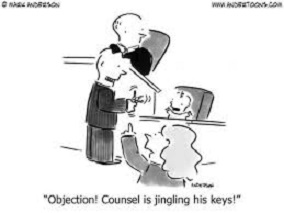
24 Sep What If Your Opponent Fails to Respond to Your Written Discovery with Broad Objections?
In our last blog we discussed the different types of written discovery (interrogatories, requests for production, and requests for admission) and how the discovery is to be drafted and responded to. But what if your opponent refuses to fully respond to your written discovery and instead makes broad objections to the discovery? Common broad objections include:
- Written discovery is “overbroad”
- Written discovery is “burdensome”
- Written discovery is not “relevant nor likely to lead to the discovery of admissible evidence”
- Written discovery is “not appropriately limited in time”
- Written discovery improperly “seeks information protected by the attorney client and/or work product privilege”
- Written discovery is “ambiguous”
Your opponent will then probably state that he is limiting his discovery responses subject to the foregoing objections. If you and your attorney do not address this improper discovery tactic head on, your opponent will effectively shield each and every one of his discovery responses behind these broad objections, making his responses meaningless.
To avoid this problem, it is imperative that you and your attorney address the situation head on, as soon as practicable after receiving the improper objections.
What Do the Rules Say?
Rules 33 (governing interrogatories), 34 (governing requests for production) and 36 (governing requests for admission) all provide some guidance for how your opponent should respond to your written discovery.
Generally, all of these rules state that if your opponent objects to a discovery request, and is not going to fully respond to a discovery request, that he or she must state with specificity the reasons for objection and shall answer/admit/respond to the extent the discovery request is not objectionable. Notably, your opponent must also state whether any responsive information is being withheld on the basis of an objection. The rules further state that “lack of information” or “lack of knowledge” are generally not proper reasons for failing to admit or deny requests for admission, and if he does not admit a particular request for admission, he must specifically deny the matter, or set forth in detail why he cannot truthfully admit or deny it.
Based on these rules, your opponent’s use of broad objections, coupled with a complete failure to respond to discovery requests, is typically prohibited. Both the rules and case law prohibit the use of broad objections. For example, Rule 26 states that if your opponent makes objections “without substantial justification”, the court, upon motion or upon its own initiative, may impose on your opponent “an appropriate sanction, which may include an order to pay the amount of the reasonable expenses incurred because of the violation, including reasonable attorney fees.” Case law also confirms that while “the discovery rules are construed liberally”, the court has broad discretion “to order and to determine the nature of sanctions for a party’s failure to comply with discovery.” Scott v. Matlack, Inc., 39 P.3d 1160, 1172 (Colo. 2002), as modified (Feb. 4, 2002). But the court cannot help you unless you seek its help.
Seek the Court’s Help Early On with a Motion to Compel
If you and your attorney receive incomplete responses or overly broad objections to your written discovery requests, your attorney has the duty to file a motion to compel and to seek a hearing with the court. Your attorney should not wait and then try to take advantage of the improper response at trial. If you wait too long, the court won’t think you were prejudiced, but rather that that you were just being clever, and may be less sympathetic to your cause.
Also keep in mind courts are often hesitant to get involved in discovery fights, so make sure your motion is well-grounded and very clear about your opponent’s egregious discovery activity.
The motion should be made under Rule 37, to compel an answer; compel a designation; or to obtain an order compelling inspection in accordance with the request. Your motion should also seek sanctions, such as a request for attorneys’ fees. Lastly, the motion must include a certification that your attorney talked with your opponent’s attorney, in an attempt to get the requested information without court action.
What If Your Opponent Still Fails to Respond
If your opponent has not timely sought a motion for protective order, and improperly withholds information in light of a successful motion to compel, he or she will have a very hard time winning the favor of the court. For example, if your opponent is sanctioned, he or she may not later object to a Rule 37 sanction on the grounds that the original discovery request was improper. This is because, once sanctions are sought, the party that failed to file for a protective order has waived its objection to the admissibility of evidence it failed to produce through discovery. See Rule 37(d); Matlack, Inc., 39 P.3d at 1172–73.
If your opponent improperly refuses to respond to your written discovery requests, and you’d like a second opinion on how best to gather the responses (and maybe recoup attorneys’ fees), call Edwards Law today for a free initial consultation.


No Comments